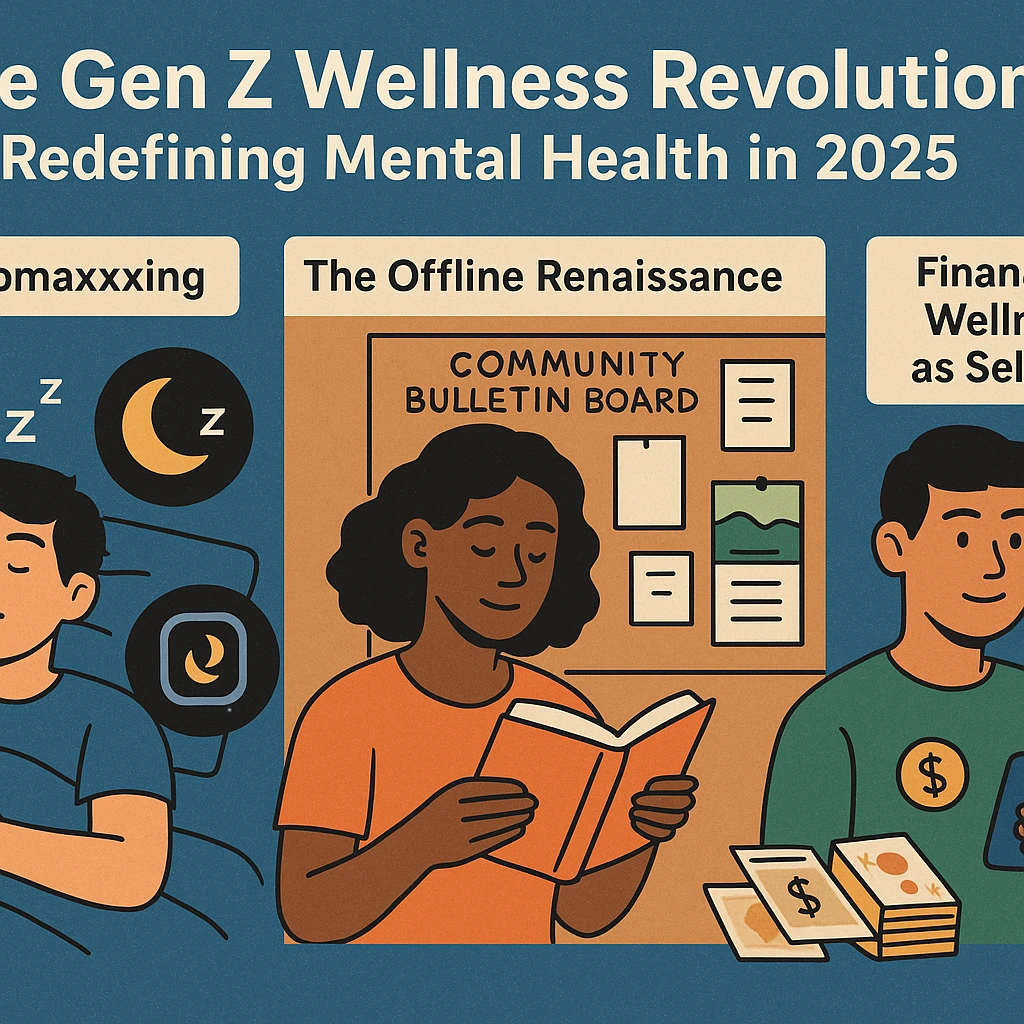Why Gen Z’s Approach to Well-Being Is Changing Everything
Move over avocado toast – Gen Z’s latest obsession is optimizing every aspect of their well-being. This digitally-native generation is pioneering a radical new approach to mental health that’s shaking up workplaces, consumer habits, and social norms.
What makes their strategy different? It’s not just about meditation apps and therapy speak. Gen Z is taking a systematic, almost scientific approach to wellness that combines:
- Biological optimization (sleep tracking, nootropics)
- Community-first living (IRL connections > social media)
- Financial self-preservation (salary transparency, “soft saving”)
Let’s examine how these trends are manifesting in 2025 and why they matter.
The Three Pillars of Gen Z Wellness
1. Sleepmaxxing: The New Productivity Hack
While previous generations bragged about all-nighters, Gen Z measures status by sleep metrics. This isn’t just about getting more rest – it’s about precision recovery.
2025 Sleep Trends:
- 63% of Gen Z workers negotiate sleep schedules into employment contracts
- “Sleep tourism” is now a $12B industry featuring circadian lighting hotels
- 45% use wearable devices to track REM cycles and body temperature
Corporate Response:
Google now offers nap pods with AI sleep coaches, while Unilever has banned before-9am meetings globally.
2. The Offline Renaissance
After growing up in digital isolation, Gen Z is sparking a real-world connection revival. But this isn’t your grandmother’s community center.
New Social Models:
- Silent book clubs (reading together, no small talk)
- Urban foraging groups (part sustainability, part mindfulness)
- Analog gaming leagues (think physical chess tournaments)
Case Study:
Starbucks’ “Third Place 2.0” initiative removed WiFi passwords and added community bulletin boards, resulting in 28% longer customer dwell times.
3. Financial Wellness as Self-Care
Gen Z approaches money management with the same rigor as their sleep hygiene.
Radical Financial Transparency:
- 84% discuss salaries openly with peers
- “Soft saving” prioritizes life experiences over traditional retirement
- 62% have “money dates” to review finances with friends
Emerging Solutions:
Fintech startups like Stackwell offer investment therapy, combining portfolio management with cognitive behavioral techniques.
The Ripple Effects
Workplace Revolution
- 4-day workweeks now standard at 42% of Fortune 500 companies
- “Right to disconnect” laws in 15 countries
- Vacation shaming replaced by “PTO bragging”
Consumer Market Shifts
| Industry | Gen Z-Driven Change | Impact |
|---|---|---|
| Fashion | “Comfortcore” overtakes quiet luxury | Lululemon market cap +35% |
| Tech | “Dumb phone” sales up 300% | Light Phone valued at $2B |
| Food | Functional mushrooms in 60% of CPG | Reishi coffee a $800M category |
The Backlash
Some critics argue this hyper-focus on optimization creates new anxieties:
- “Sleep guilt” from imperfect rest metrics
- Financial FOMO from peer comparisons
- Pressure to curate “perfect” offline experiences
What Comes Next?
As Gen Z enters their prime spending and career years, expect:
- AI wellness coaches that personalize mental health strategies
- Employer-sponsored financial therapy becoming standard benefits
- Hybrid digital-analog communities blending IRL and virtual connection
The question isn’t whether other generations will adapt to these changes – but how quickly they can keep up.
Key Takeaways
- Gen Z treats well-being as an integrated system (sleep + money + community)
- Corporations must align with these values or risk irrelevance
- The line between self-care and self-optimization is blurring
- This isn’t a passing trend but a fundamental values shift
Your Move: Which Gen Z wellness trend will you adopt first? Track your sleep? Start a money circle? Or maybe just put your phone away for a real conversation? The tools for better living are here – the rest is up to you.



